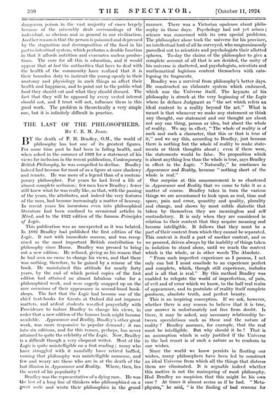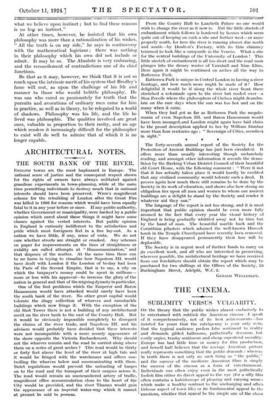THE LAST OF THE PHILOSOPHERS.
BY C. E. M. JOAD.
BY the death of F. H. Bradley, 0.M., the world of philosophy has lost one of its greatest figures. For some time past he had been in failing health, and when asked in the summer of 1923 for a statement of his views for inclusion in the recent publication, Coniemporary British Philosophy, he was compelled to decline. Bradley indeed had become for most of us a figure at once shadowy and remote. He was more of a legend than of a contem- porary philosopher. For years he had lived a life of almost complete seclusion ; few men knew Bradley; fewer still knew what he was really like, so that, with the passing of the years, the attributes, and indeed the very features of the man, had become increasingly a matter of hearsay. In recent years his incursions even into philosophical literature had been confined to occasional articles in Mind, and to the 1922 edition of the famous Principles of Logic.
This publication was as unexpected as it was belated. In 1882 Bradley had published the first edition of the Logic. It met with immediate success, and was recog- nized as the most important British contribution to philosophy since Hume. Bradley was pressed to bring out a new edition. He refused, giving as his reason that he had seen no cause to change his views, and that there was nothing, therefore, to be gained by a reissue of the book. He maintained this attitude for nearly forty years, by the end of which period copies of the first edition had attained an almost fabulous value for a philosophical work, and were eagerly snapped up on the rare occasions of their appearance in second-hand book- shops. The fact that the Logic had become one of the chief text-books for Greats at Oxford did not improve matters, and ardent students wrestled prayerfully with Providence to induce Bradley to change his views, in order that a new edition of the famous book might become available. Appearance and Reality, Bradley's other great work, was more responsive to popular demand ; it ran into six editions, and for this reason, perhaps, has never attained to quite the celebrity of the Logic. Now, Bradley is a difficult though a very eloquent writer. Most of the Logic is quite unintelligible on a first reading ; many who have struggled with it manfully have retired baffled, vowing that philosophy was unintelligible nonsense, and few and weary are those who are in at the death of the last illusion in Appearance and Reality. Where, then, lies the secret of his popularity ?
Bradley was the representative of a dying race. He was the last of a long line of thinkers who philosophized on a great scale and wrote their philosophies in the grand manner. There was a Victorian opulence about philo- sophy in those days. Psychology had not yet arisen ; science was concerned with its own special problems. The philosopher alone took the universe for his province, an intellectual lord of all he surveyed, who magnanimously parcelled out to scientists and psychologists their allotted spheres. To-day the claims of the philosopher to give a complete account of all that is are derided, the unity of his universe is shattered, and psychologists, scientists and mathematical logicians content themselves with cata- loguing its fragments.
Bradley was a survival from philosophy's better days. He constructed an elaborate system which embraced, which was the Universe itself. The keynote of his philosophy is struck at the very beginning of the Logic where he defines Judgment as "the act which refers an ideal content to a reality beyond the act." What is meant is that whenever we make any statement or think any thought, our statement and our thought are about not any one thing, person or idea, but about the whole of reality. We say in effect, "The whole of reality is of such and such a character, that this or that is true of it," and we say this, according to Bradley, just because there is nothing but the whole of reality to make state- ments or think thoughts about ; even if there were, the statements would be false. No proposition which is about anything less than the whole is true, says Bradley in effect in the Logic. "Naturally," he continues in Appearance and Reality, because "nothing short of the whole is real."
Our surprise at this announcement is so chastened In Appearance and Reality- that we come to take it as a matter of course. Bradley takes in turn the various things we are accustomed to look upon as real, time and space, pain and error, quantity and quality, plurality and change, and shows by most subtle dialectic that taken by themselves they are meaningless and self contradictory. It is only when they are considered in relation to their context that they acquire meaning and become intelligible. It follows that they must be a part of their context from which they cannot be separated. This context is itself a part of another context, and so we proceed, driven always by the inability of things taken in isolation to stand alone, until we reach the context which is the whole, or in other words The Absolute.
"From such imperfect experience as I possess, I not only can but I must conclude to an experience perfect and complete, which, though still experience, includes and is all that is real." By this method Bradley was enabled to relegate the world of imperfection, of pain, of evil and of error which we know, to the half real realm of appearance, and to postulate of reality itself complete goodness,- absolute truth, and perfect beauty.
This is an inspiring conception. If we ask, however, whether there is any reason to believe that it is true, our answer is unfortunately not free from doubt. Is there, it may be asked, any necessary relationship be- tween speculations such as these and the nature of reality ? Bradley assumes, for example, that the real must be intelligible. But why should it be ? That is an assumption which is only justified if the Universe in the last resort is of such a nature as to conform to our wishes.
Since the world we know persists in flouting our wishes, many philosophers have been led to construct an ideal Universe from which all the things that distress them are eliminated. It is arguable indeed whether this motive is not the mainspring of most philosophy. Had Bradley no suspicion that this might be his own case ? At times it almost seems as if he had. "Meta- physics," he said, "is the finding of bad reasons for what we believe upon instinct ; but to find these reasons is no le sp an instinct."
At other times, however, he insisted that his own philosophy was more than a rationalization of his wishes. "All the truth is on my side," he says in controversy with the mathematical logicians ; there was nothing in their philosophy which his own did not include or admit. It may be so. The Absolute is very embracing, and the reconcilement of contradictions one of its chief functions.
Be that as it may, however, we think that it is not so much upon the intrinsic merit of his system that Bradley's fame will rest, as upon the challenge of his life and manner to those who would belittle philosophy. He was one who cared so passionately for truth that the pursuits and avocations of ordinary men came for him in practice, as well as in theory, to be relegated to a world of shadows. Philosophy was his life, and the life he lived was philosophic. The qualities involved are great ones, valuable in proportion to their rarity, and an age which renders it increasingly difficult for the philosopher to exist will do well to admire that of which it is no longer capable.











































 Previous page
Previous page